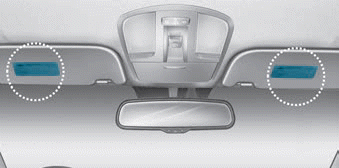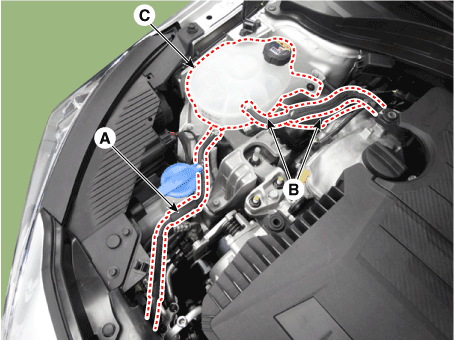Hyundai Ioniq: Cooling System / Reservoir Tank. Repair procedures
Hyundai Ioniq (AE) 2017-2025 Service Manual / Engine Mechanical System / Cooling System / Reservoir Tank. Repair procedures
| Removal and installation |
| 1. | Loosen the drain plug, and drain the engine coolant. Remove the reservoir cap to help drain the coolant faster. (Refer to Cooling System - "Coolant") |
| 2. | Remove the reservoir tank.
|
 Radiator. Repair procedures
Radiator. Repair procedures
Removal and Installation1.Loosen the drain plug, and drain the engine coolant. Remove the reservoir cap to help drain the coolant faster.(Refer to Cooling System - "Coolant")2...
 Water Temperature Control Assembly. Components and components location
Water Temperature Control Assembly. Components and components location
Components1. Water temperature control (WTC) outlet fitting2. Water temperature control (WTC) housing3. Water temperature control (WTC) gasket4. Water temperature control (WTC) outlet fitting gasket5...
Other information:
Hyundai Ioniq (AE) 2017-2025 Service Manual: Specifications
SpecificationAir Conditioner item Specification CompressorTypeHES20 (Electric Scroll)Communication typeCAN communicationOil type & CapacityPOE Oil, 130 ± 10cc (4.58 ± 0.35oz.)Motor typeBLDCRated voltage240VOperation voltage160 - 275VExpansion valveTypeBlock type RefrigerantTypeFor Europe (Regulated area)Except EuropeR - 1234yf R - 134a Capacity600 ± 25 g (21...
Hyundai Ioniq (AE) 2017-2025 Service Manual: Camshaft Position Sensor (CMPS). Repair procedures
Inspection1.Check the signal waveform of the CMPS and CKPS using the GDS. Specification : Refer to "Wave Form"Removal • DON’T remove the camshaft position sensor while the engine is running or right after engine is turned off...
Categories
- Manuals Home
- 1st Generation Ioniq Owners Manual
- 1st Generation Ioniq Service Manual
- Hybrid battery SOC (State of Charge) gauge
- Theft-alarm System
- Auto Door Lock/Unlock Features
- New on site
- Most important about car
Air Bag Warning Labels

Air bag warning labels, required by the U.S. National Highway Traffic Safety Administration (NHTSA), are attached to alert the driver and passengers of potential risks of the air bag system. Be sure to read all of the information about the air bags that are installed on your vehicle in this Owners Manual.
Copyright © 2025 www.hioniqae.com




